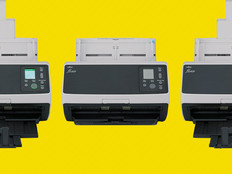Maine State Library Relies on Technology to Take on Important Digitization Project
While we are increasingly living in a more digital world, there are significant gaps in our history that haven’t yet made the transition to a digitized form.
As libraries transition from being repositories for printed books to collaboration and community centers, they continue to play an important role in bridging the physical and digital worlds.
The Maine State Library (MSL) is currently undergoing an important initiative to digitize the microfilm of historical state newspapers. This initiative is supported by a $275,000 grant from the National Endowment for Humanities (NEH). The grant covers “the digitization of 100,000 pages of historic Maine newspapers published between 1836 and 1922 as part of the state’s participation in the National Digital Newspaper Program.”
While the grant offers a much needed injection of funding for the library’s digitization efforts, it doesn’t come close to covering everything the library would like to convert.
“There are hundreds of historical newspapers in Maine and only a fraction of that content will be digitized by the NEH grant,” says Adam Fisher, director of collections development and digital initiatives for Maine State Library. “We are hoping to inspire volunteers or other fundraisers to sponsor the digitization of newspapers of importance to their communities using equipment here at the library that we allow the public to use at no charge.”
The Tech Behind Library Digitization Work
While the NEH grant is funding the digitization of microfilm content, the library’s staff and volunteers are hard at work digitizing many other materials the old-fashioned way: with scanners and manpower.
“Many of our images are digitized with fairly basic flatbed scanners that are capable of capturing content from photographs, slides, film and glass plate negatives in high resolution,” says Fisher. “Last year we acquired a Kodak i4200 imaging unit that is great for digitizing unbound documents. We have it running vintage postcards at the moment and have been very impressed by the results. You can take a stack of postcards of different dimensions and load them into the feeder and it will automatically image both sides of each card in high resolution and provide cropped content. It can do hundreds of cards an hour.”
But what happens to all of that content once it’s scanned? That’s where the internet and the cloud come in.
Digital Maine Brings Library Content to the Cloud
The Maine State Library has set up a digital repository for all of this content, which lives on a site it calls Digital Maine. The site is hosted on the Digital Commons platform, built by bepress on a public cloud-based infrastructure.
Digital Commons is web-friendly and search engine-optimized, two features that attracted MSL to this platform.
“When we were exploring our different options for hosting of digital collections, we knew we needed to use a platform that worked well with other institutional systems,” says Fisher. “Our goal has been to have our content discoverable as part of the Digital Public Library of America, and Digital Commons is compatible with the Open Archives Initiative Protocol for Metadata Harvesting (OAI-PMH) standard that is a critical component to allowing the content to be indexed and found in other systems.”
Many institutions, including university and public libraries, use Digital Commons and with bepress’s history in journal publishing, it uniquely understands the needs and nuances of this kind of work.
“Scholarship has changed dramatically over the last 17 years,” says Promita Chatterji, Product Marketing Manager at bepress. “People are doing things much more digitally. The amount of materials, the amount of data, the amount of video that people need to store and manage and organize is just increasing.”
Building this platform on the public cloud enables the Digital Commons platform to increase its availability, uptime and agility.
“I think that decision be on the cloud seems to be aligning with the way that digital scholarship is growing,” says Chatterji. “It takes a lot of specialized skills to maintain and keep software up to date if it’s on an institution’s local server. Having a hosted service is beneficial for institutions that don’t want to or can’t afford to be dependent on an IT department.”
The MSL did explore building the repository in-house, but ultimately was guided to a hosted solution by the state’s IT team.
“The State of Maine Office of Information Technology supports many of our IT needs, but we have developed our own in-house knowledge to support and facilitate our digitization projects,” says Fisher. “We initially explored having the state OIT build a repository product for us to house our digital collections, but they ultimately steered us in the direction of using an off the shelf product that could be customized to our needs.”
Self-Service Tech Empowers Citizens and Government Agencies
The decision to use Digital Commons suggests a broader self-service trend emerging in state and local governments thanks to cloud-based solutions: Because more technology doesn’t require on-premises maintenance, staff can be in control of their destiny (i.e., their work) and rely less on IT workers as the middlemen.
For example, the Lucas Metropolitan Housing Authority in Ohio “no longer needs a hardware technician to replace hard drives or other hardware-related maintenance tasks,” StateTech reported in May.
Other libraries that might be embarking on digitization projects should, Fisher says, prepare for some challenges: a lack of in-house expertise, minimal investments in equipment and technology, and figuring out how to store and serve the digitized content once the scanning process is completed.
“We made significant investments in technology and took the time to understand and apply best practices to our digitization work,” he says.









